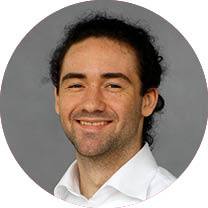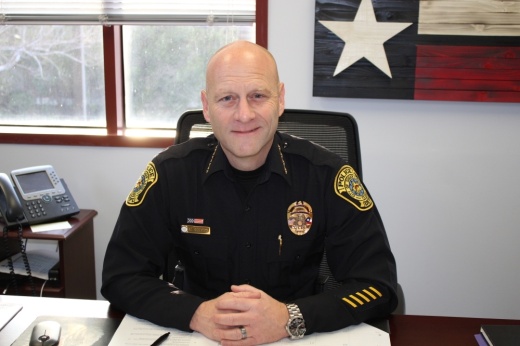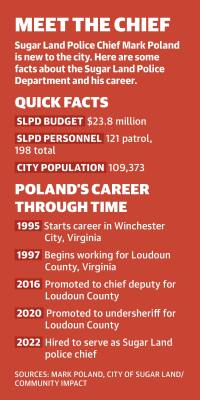Since then, Poland has had time to catch his breath after an “arduous” four months of essay-writing, testing and interviews before being officially approved by the Sugar Land City Council at a Nov. 1 meeting.
Prior to working with the city of Sugar Land, Poland served for 25 years as the undersheriff for Loudoun County, Virginia’s largest full-service sheriff’s department. Poland holds a bachelor’s degree in police science from George Washington University and a master’s degree in homeland security from The Naval Postgraduate School.
Community Impact held an interview with Poland to see how the new chief has adjusted to his role. In this interview, Poland touches on new initiatives, his modus operandi and culture at the Sugar Land Police Department.
What have been your priorities in this job?
Right now, we’re fostering priorities with the communities, trying to understand what is important to the residents of Sugar Land. We’re also trying to leverage technology and use partnerships to really make our department the most effective and reliable that it can be.
Internally, within the department, I’m trying to shape a culture. I think treating the entire department as one team is really important—everyone needs to talk to each other and be able to have that ability to communicate with one another. I really look at running this department like a business, and public trust is my profit.
What have you done in your four months with the department?
So far, we’ve focused on the use of technology within the department, including the use of license plate reader (LPR) technology. We’ve really expanded the use of cellphones and applications to expedite issues, and we’ve become more efficient in reporting.
Could you share some initiatives that your department is working on?
One new initiative that appears to work quite well in other departments that we’d like to bring to Sugar Land is Project Lifesaver. We provide a bracelet with a monitoring system for folks with dementia or Alzheimer’s. The bracelets aren’t live, meaning we can’t track them all the time, but if they do wander, we can bring them home.
We’re also working with the department of innovation to provide a “lessons in law enforcement” program for teenagers, with the goal of introducing them to law enforcement. Luckily, Sugar Land has a very active police academy, and I’d like to take advantage of that.
I also plan on conducting a staffing analysis to see if we have the appropriate amount of officers, administrative workers and so on.
During this interview, you mentioned six pillars that you follow for success in running a police department. What are they?
The “six pillars” as I like to call them came about during my time in Loudoun County, but I suppose they were never really formalized into policy until I came here. They are family first, professionalism, leadership, accountability, employee growth and communication.
Many police departments show problems in retaining officers. Is Sugar Land experiencing officer retention issues, like many departments statewide?
It’s a bit too early to say, and as we have yet to complete our staff review, I wouldn’t feel comfortable speaking to retention rates.
However, I would say that the most important thing for keeping officers is culture. Pay really isn’t the main reason that officers leave—when they do, it’s the culture.
If you had one thing to say to the residents of Sugar Land, what would it be?
We’re going to keep our foot on the gas. I really want to set the industry standard, but it takes time, and it takes a lot of work from everyone.






